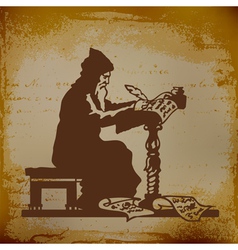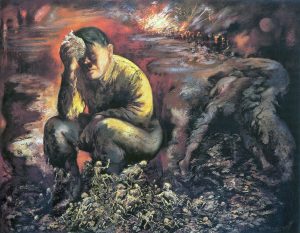Cain’s rash decisions and behavior destroy any hope of spiritual renewal or pathway.
Now that Cain has killed Abel: The Lord said to Cain, “Where is your brother Abel?”
God’s question is not an indictment as so many think, the question provides Cain with the opportunity to confess. This is the third time God has attempted to renew Cain. First, he shuns Cain’s offering, which is to awaken in him spiritual and ethical standards. Second, He asks Cain why he is distraught; God mentions sin but counsels that Cain can be its master and essentially offers a helping hand. Third, He offers Cain an opportunity to confess his crime. God is a loving God and gives Cain every chance. If Cain can bring himself to confess there is still hope that God may work with him and help him.
In contrast to Abel, Cain does not seem unified within the family and under God. His value is ‘for and against’, divisive, and that technically he is the older son, the one most trusted, the one with higher status. So, we might gather that his position and invested trust is now being threatened or removed. ‘Is God supplanting me with Abel?’ From this dichotomy, Cain begins to perceive God as unrighteously against him, or certainly unfairly taking sides. ‘Why am I not good enough for you?’, Cain may as well be saying. Cain’s whole configuration of events is misconstrued, leading to a recalcitrance or disdain for God, which always leads to misery, as Cain will discover.
According to Josephus, at least a few days have passed since the murder. Cain’s guilt must be growing, the pressure increasing. God questions Cain about no longer seeing him and his brother conversing. Again, God is trying to open a door for Cain; God is lightly probing in His initial questioning. The proper response for Cain is to admit what he has done. Instead, Cain challenges God with a question of his own—he rashly replies, “Am I my brother’s keeper (guardian).” Cain hurls his defensive question, ‘Am I to keep track of him?’ The denials and excuses begin immediately.
Yet, Cain is the perpetrator, not the protector, and Cain knows that Abel lies in a field, probably hidden under some brush. How disingenuous can anyone be? With this last statement of bravado, the many sins of Cain lay bare, both of commission—of attitudes, motives, and actions—and omission, which includes the genuine love for God, love for his brother, and a willingness to be honest with himself, to confess. Cain chooses a worldly standard and concocts his irresponsible answer.
Confession proves our responsibility and provides the opportunity for change that leads to repentance. If the deed is not out in the open, confessed, how can anything be done to address the issue? Being honest with oneself is good. Taking responsibility for improper actions, confession thus becomes a powerful enlightenment principle within the Way, for it initiates a positive rebuilding of the soul. Confession allows avenues through which the spirit of God works, whether seen or unseen. These works are often accomplished in the silent places of the soul.*
*Unconscious Growth
Yet, within our story, and much like Cain’s parents also tried to explain away their actions, Cain cannot come to terms with his actions. Like many of us, Cain tries to hide behind an aggressive posture. Nor does he believe nor understand that his actions have led to horrific consequences.

Then God said, “What have you done? Hark, your brother’s bloods* (voice of your brother’s blood) cries out to me from the ground! Therefore, you shall be more cursed than the ground, which opened its mouth to receive your brother’s blood from your hand.” Verse 12, “If you till the soil, it shall no longer yield strength to you. You shall become a ceaseless wanderer (fugitive and vagabond) in the earth.”
*All of Abel’s posterity.
Abel’s blood represents the spirit of God and authentic life, or righteousness, and Cain has shed that blood. Cain’s sham manifests as his worldliness, his self-centeredness, while Abel’s authenticity was his godliness. Abel was the righteous remnant (see, Righteous Abel P. 2). Physical life is precious but spiritual life is precious also; unrighteous actions squander both. Scripture is replete with lessons concerning the damage anger can do. The story of Cain and Abel points to a lesson: never cut yourself off from God, from righteousness, by wrathful speaking or behavior. Many of us have rued the day of their wrathful speaking or rash behavior, and soon Cain will discover the same.
This is the second time God has cursed* the ground due to man’s actions. The first is in the garden, v. 3.17, speaking to Adam, “Cursed is the ground for your sake; in toil (also, in sorrow) you shall eat of it all the days of your life.” God mentions ‘thorns and thistles’ and ‘in the sweat of your face’. Even though the land will still yield, disobedience will always garner more toil in the long run and becomes yet another enlightenment principle portrayed in this saga. For Cain, we never again hear of him tilling the ground, and in that sense he is no longer connected to that part of God’s bounty.
*Cursed, removal of favor from the land. That is, it rains when it rains, and not when not.
The principle concerning exactitude under the Law of Cause and Effect, or the Law of Rectitude now manifests. Exactitude even unto every jot and tittle (yud or stroke within the OT), just as Jesus mentions in Matt. 5.18, must be fulfilled, and this is precisely what happens here. Cain’s livelihood, unlike Adam’s, is completely taken from him. Adam and Eve threw away their spiritual heritage, but Cain murdered the righteous remnant God had sown upon the earth. Nor would Cain come to terms with his actions. The reasons for judgment are compelling.
*
ACCOUNTABILITY—CAIN RUNS FROM LIFE
How is this curse to be implemented? God’s decision oversees both the spiritual world, or above, and the physical world below.* God delivers Cain into a desert land, this land of Nod. Even though destined to wander, yet not considered a nomad but correctly designated a fugitive (Gn. 4.12), he later settles into a more verdant area near the Euphrates. Cain can no longer engage in pastoral life.
*See e-book, Treasure Above, Treasure Below.
A fugitive from whom? Nothing and no one would be
pursuing him but the higher laws of God.
Spiritual law always returns the soul to accountability.
The ‘Law of Accountability’* will leave Cain separated from God and then left to operate within his corrupted reasoning. The rejection of God leaves Cain’s efforts wedded only to Cain’s judgment but does not source the spirit of God. Cain has designated (named) himself. He is a fugitive from God. The fugitive status leaves little room for where to run next, whether in the physical world or spiritually. Cain will spend the rest of his life running from himself, and the next verse indicates this very reality.
*Today we simply express this as cause and effect; biblically expressed as the law of bounty, or if within corruption as the Law of Rectitude or Retribution.
Verse 4.13: “Cain said to the Lord, ‘My punishment is too great to bear! Since you have banished me this day from the soil, and I must avoid Your presence and become a restless wanderer on earth—anyone who meets me may kill me!’” His punishment too great to bear is yet another reflection upon himself. He considers God’s judgment as fundamentally unfair, too extreme. He still does not see the magnitude of his sin, and essentially complains. It is Cain who is now being wronged by God, at least as Cain sees it.
The punishment looms large. By being banished from the soil Cain’s livelihood is removed. He not only killed Abel, but he also disrupted the wholeness of the family. By murdering Abel, Cain has destroyed a portion of the family of man. Blood spilled by murder yields no crop. As to the mark of Cain,* given so Cain will remain protected from others—even though Cain remains in sufferance, God allows for mitigation, yet His word is completed. Cain will be allowed to live his life but without the edification of God. Perhaps the worst curse of all, Cain will remain Cain.
*Thought to be an “X” or cross mark, or the last letter of the Hebrew alphabet.
The second curse, God’s presence will avoid him, cements the idea that Cain’s character fits the pagan world he discovers in Nod—a world of uneven prospects, though not necessarily a world yet filled with violence or war. Severe separation or loss leaves a vacuum in circumstance, as all men and women have experienced, the emptiness all men seek to avoid. This separation was initiated by wrath and violence and we will find that Cain’s void is filled with the same—suffering Cain trudges on.
Restlessness and wandering, the third curse, does not infer restlessness and wandering only in the physical world. Cain will remain restless in his soul, never knowing any true peace, producing a sodden and unresolved soul-nature. Many people have experienced similar issues as Cain and lived through similar results.
Cain’s punishment is complete, just as his action against Abel was complete. Cain and his ancestors will bring change to the face of man. Cain’s lineage will be typified with hubris, ungodliness, and will bring changes to mankind. A strong right arm will lead Cain and his ancestors into the curse of all curses.
I hope you have enjoyed Cain’s continuing story. Comments are welcome.

God bless!


I was reading some of your articles on this site and I believe this site is rattling instructive! Retain putting up.
Thanks Gralion,
Am caught up in moving right now. Stay tuned, The work on this site will get deeper, more to come. Will follow your instruction to keep “putting up”, but need some time as I am relocating.
C. Ray
I congratulate, what necessary words…, a magnificent idea
In it something is. Thanks for an explanation, I too consider, that the easier the better …
What necessary words… super, an excellent idea
I like this weblog it’s a master piece! Glad I observed this ohttps://69v.topn google.